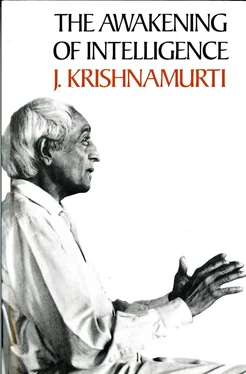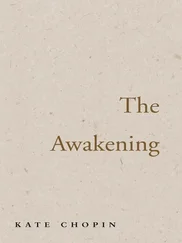Naudé: You mean are they two ends of the same stick ?
KRISHNAMURTI: Two ends of the same stick—or are they two wholly separate things? So what is evil and what is good? The Christian world, the Inquisition, used to burn people for heresy, considering that was good.
Naudé: The Communists do the same.
KRISHNAMURTI: The Communists do it in their own way: for the good of the community, for the good of society, for the good of an economic well-being for the whole of man, and so on. In Asia too they have done all this kind of thing in various forms. But there has always been a group, until recently, where killing in any form was considered evil. Now all that is slowly disappearing, for economic and cultural reasons.
Naudé: You mean the group that avoids killing . . .
KRISHNAMURTI: … is gradually disappearing. So there it is. Now is there such a thing as absolute good, and absolute evil? Or is it a gradation: relative goodness and relative evil?
Naudé: And do they exist as facts outside of conditioned points of view? For instance, for the Frenchman during the war the invading German was evil; and similarly for the German, the German soldier was good, he represented protection. Now is there a good and an evil, absolutely? Or is it simply the result of a conditioned point of view?
KRISHNAMURTI: Is goodness dependent on the environment, on the culture, on economic conditions? And if it is, is it good? Can goodness flower as an environmental, cultural conditioning? And is evil also the result of environmental culture? Does it function within that frame, or does it function outside it? All these questions are implied when we ask: is there an absolute goodness and absolute evil?
Naudé: Right.
KRISHNAMURTI: First of all, what is goodness? Isn’t the word “goodness” related to the word “God”? God being the highest form of the good, truth, excellence, and the capacity to express in relationship that quality of godliness, which is goodness; and anything opposite that is considered evil. If goodness is related to God, then evil is related to the devil. The devil being the ugly, the dark, the . . .
Naudé: . . . the twisted . . .
KRISHNAMURTI: . . . the distorted, the purposefully directed harmful, such as the desire to hurt—all that is contrary to the good; that is, the idea of God being good and the devil being the evil—right? Now I think we have more or less indicated what is good and what is evil. So we are asking if there is such a thing as absolute good and absolute, irrevocable evil.
Naudé: Evil as a fact, as a thing.
KRISHNAMURTI: Therefore let us first examine if there is absolute good. Not in the sense of goodness being related to God, or approximating itself to the idea of God, because then that goodness becomes merely speculative. Because God to most people is really a pretence of a belief in something—something excellent, noble.
Naudé: Felicity?
KRISHNAMURTI: Felicity and so on. Now what is good? I feel goodness is total order. Not only outwardly, but especially inwardly. I think that order can be absolute, as in mathematics I believe there is complete order. And it is disorder that leads to chaos, to destruction, to anarchy, to the so-called evil.
Naudé: Yes.
KRISHNAMURTI: Whereas total order in one’s being, order in the mind, order in one’s heart, order in one’s physical activities—the harmony between the three is goodness.
Naudé: The Greeks used to say that perfected man had attuned in total harmony his mind, his heart and his body.
KRISHNAMURTI: Quite. So we shall say for the moment that goodness is absolute order. And as most human beings live in disorder they contribute to every form of mischief, which ultimately leads to destruction, to brutality, to violence, to various injuries, both psychic and physical. For all that one word may be used: “evil”. But I don’t like that word “evil” because it is loaded with Christian meaning, with condemnation and prejudice.
Naudé: Conditioning.
KRISHNAMURTI: That’s right. In India and in Asia the words “evil”, “sin”, are always loaded—as “goodness” is always loaded. So could we brush away all the accumulations around these words and look at it as though anew. That is: is there absolute order in oneself? Can this absolute order be brought about in oneself and therefore in the outer world? Because the world is me, and I am the world; my consciousness is the consciousness of the world, and the consciousness of the world is me. So when there is order within the human being then there is order in the world. Now can this order, right through, be absolute? Which means: order in the mind, in the heart and in the bodily activities. That is, complete harmony. How can this be brought about? That is one point.
Then the other point is: is order something to be copied according to a design? Is order pre-established by thought, by the intellect, and copied in action by the heart? Or in relationship? So is order a blueprint? How is this order to be brought about?
Naudé: Right.
KRISHNAMURTI: Order is virtue. And disorder is non-virtue, is harmful, is destructive, is impure—if we can use that word.
Naudé: One thinks of the Sanskrit word “Adharma” .
KRISHNAMURTI: Adharma , yes. So is order something put together according to a design drawn by knowledge, thought? Or is order outside the field of thought and knowledge? One feels there is absolute goodness, not as an emotional concept, but one knows, if one has gone into oneself deeply, that there is such a thing: complete, absolute, irrevocable goodness, or order. And this order is not a thing put together by thought; if it is, then it is according to a blueprint, but if it is imitated then the imitation leads to disorder, or to conformity. Conformity, imitation, and the denial of what is, is the beginning of disorder, leading ultimately to what may be called evil. So we are asking: is goodness, which is (as we said) order and virtue, is it the product of thought? Which means can it be cultivated by thought? Can virtue ever be cultivated? To cultivate implies to bring slowly into being, which means time.
Naudé: Mental synthesis.
KRISHNAMURTI: Yes. Now is virtue the result of time? And is order therefore a matter of evolution? And so is absolute order, absolute goodness, a matter of slow growth, cultivation, all involving time? As we said the other day, thought is the response of memory, knowledge, and experience, which is the past, which is stored up in the brain. In the brain cells themselves the past is . So does virtue lie in the past and is it therefore cultivatable, to be pushed forward? Or is virtue, order, only in the now? The now is not related to the past.
Naudé: You are saying that goodness is order and that order is not the product of thought; but order, if it exists at all, must exist in behaviour, behaviour in the world and in relationship. People always think that proper behaviour in relationship, in the world, must be planned, that order is always the result of planning. And quite often people get the idea, when they have listened to you, that awareness, the state of being you speak about in which there is no room for the action of thought, they get the feeling that this is a sort of disincarnate energy, which can have no action and no relationship to the world of men and events and behaviour. They think that therefore it has no real value, and not what you might call a temporal and historical significance.
KRISHNAMURTI: Right, Sir.
Naudé: You are saying that goodness is order and order is not planned.
KRISHNAMURTI: When we talk about order, don’t we mean order in behaviour, in relationship, not an abstract order, not a goodness in heaven, but order, goodness in relationship and action in the now. When we talk about planning, obviously there must be planning at a certain level.
Читать дальше












